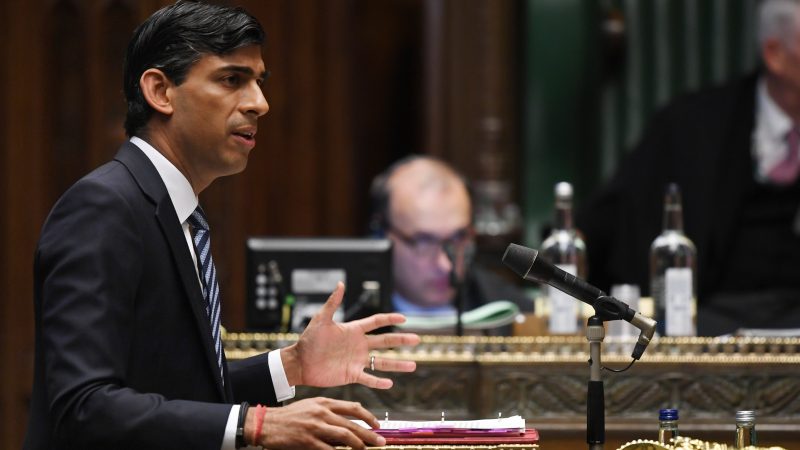
The Labour Party has welcomed a “U-turn” by the government after Chancellor Rishi Sunak announced today that a new jobs support scheme would replace the existing furlough scheme ending next month.
The economic update delivered by the Chancellor to parliament promised that the scheme, set to start in November and run for six months, would protect “viable jobs” in businesses facing lower demand due to Covid-19.
It will see eligible employees – those working at least one third of their normal hours – have their hours worked paid by employers and their hours not worked paid jointly by the government and their employer.
For the time that workers are not working, the government will pay a third of the workers’ usual pay and the employer will pay another third of their usual pay. Those eligible will be paid 77% of their usual pay in total.
Sunak said there was conditionality in the scheme, which will only be available for larger companies that are seeing a decline in revenues due to Covid, evidenced by whether their turnover has dropped by a third.
The Chancellor claimed to MPs that the existing self-employed grant would be “extended on similar terms and conditions to the new jobs support scheme” – under which government support is capped at £697.92 a month.
But the self-employment income support scheme (SEISS) extension will only support “viable traders” by covering 20% of average monthly trading profits via a government grant, according to the Treasury.
Responding to the Chancellor’s winter plan, Labour’s Anneliese Dodds said: “I have called for the introduction of a system of targeted wage support 40 times. That call has been rebuffed by his government 20 times. It’s a relief they have U-turned now.
“But this comes too late for many people who have already lost their jobs – because the businesses employing them believed there would be no wage support following the end of next month.”
The Shadow Chancellor argued that the plan was announced too late, questioned whether the new jobs scheme truly incentivises short-hours working, and highlighted the need for training and retraining of workers.
Dodds also urged her opposite to work with his colleagues on improving the test and trace system, which she described as currently “having a substantial negative impact on our economy” due to its failures.
The TUC’s Frances O’Grady offered support to the Chancellor’s winter plan, along with the CBI director general Carolyn Fairbairn, but trade unions expressed reservations about the new economic update.
GMB acting general secretary John Phillips said: “Whether this is enough to stave off widespread redundancies depends very much on the detail, and it will be judged not just on jobs but on people’s living standards and ability to pay the bills.”
He added: “It’s incredibly disappointing not to see much bolder, forward thinking action.” The GMB has called for “investment in infrastructure, training and skills in sustainable jobs and industries” in addition to job support.
Unite’s Len McCluskey said: “The package of measures announced today by the chancellor will allow many workers and employers to breathe more easily. For some industries this will steady the very rocky floor beneath them.”
But he added: “We urge the government to work with us as we put our collective shoulders to the wheel in the task of recovering the economy, because the spectre of mass unemployment still stalks our communities.”
Transport union TSSA leader Manuel Cortes described the new scheme as “better late than never” but also said the union remains “concerned that six months is too short to really stabilise businesses and jobs”.
Usdaw responded to the plan by saying: “We are very disappointed that he made no mention of the deep difficulties the retail industry faces… High streets need radical and bold action to level the playing field between online retail and ‘bricks and mortar’ shops.”
While the TUC said it was “pleased the Chancellor has listened and done the right thing” on continued jobs support for working people, the federation added: “But there’s still unfinished business.
“Unworked hours under the scheme must not be wasted. Ministers must work with business and unions to offer high-quality retraining… And we’ll be looking closely at the details to make sure there are strings attached.”
The Association of Independent Professionals and the Self-Employed (IPSE) was most critical in its assessment of the new economic measures, described as “woefully inadequate”, with one in three self-employed people excluded.
IPSE’s policy director commented: “Limited company freelancers and the newly self-employed almost entirely missed out on support in the last lockdown and have faced bleak months of financial devastation.
“Now they face a dark winter ahead unless the government does more for them. Based on the drastic financial hit self-employed people took in the last lockdown, the new 20% cap on support is likely to be nowhere near enough.”
UNISON was most positive, with Dave Prentis saying: “These measures show the Chancellor has been listening to unions and businesses. Supporting the wages of workers is an important first step in the battle to protect jobs across the UK.”
The Treasury yesterday announced that the autumn Budget would be cancelled as “now is not the right time to outline long-term plans”, and the Chancellor instead delivered his statement to the Commons today.
Dodds set out earlier this week to Labour’s ‘Connected’ conference “three steps to a better, more secure future” with an alternative economic plan from the party to “recover jobs, retrain workers and rebuild business”.




More from LabourList
‘Labour’s quiet quest for democratic renewal’
‘Labour promised to make work pay. Now it must deliver for young people’
‘Council Tax shouldn’t punish those who have the least or those we owe the most’